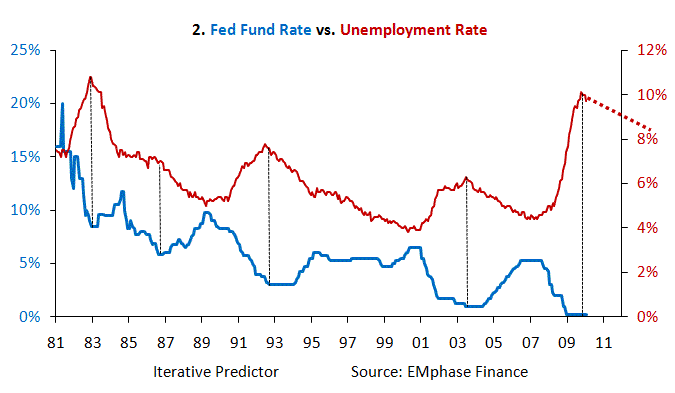Kevin Williamson from National Review Online writes:
The cost of mass unemployment is not only the loss of income and dignity suffered by the jobless. The real cost includes the loss of theeconomic output of the unemployed.
This sounds like something Paul Krugman would say. Seems like he’s falling for the ‘we must put people to work’ leftist fallacy. Unemployed people help the economy by:
1. By giving an excuse for the fed to continue pro-growth monetary policy. What do you think is gonna happen if unemployment returns to 4.5%? Interest rates will rise, as shown below:

Bull markets tend to end when unemployment is low:

2. By increasing profit margins. Profit margins are at record highs:

We need more profits and less overpaid work. We need stocks and home prices to keep going up instead of wages going up too much.
The Creative Class isn’t losing sleep over wealth inequality or people being unable to find work, sorry. The economy adapts on a need-basis though stochastic evolution. If more U.S. workers are needed, unemployment will fall. Companies want to make profits and hiring is typically a last resort when automation or outsourcing won’t do. A liberal begging companies to do something, or else face the nondescript consequences, just isn’t convincing. Also, I’m not sure if the candy parable is supposed to be analogous to currency or individual wealth? If the former, we have the power the treasury to print more.
Some structural and frictional unemployment is needed if the economy is to grow and advance technologically. Zero percent unemployment would be undesirable and impractical. Imagine an economy where everyone has a job breaking rocks by hand. Then someone finds a way to do this with machine. Now the company can smash rocks ten times as fast without the need for workers, and the rock smashers are fired. Profits & productivity surge. This is structural unemployment. Some of the unemployed learn how to fix these machines if they break. They are re-hired. In a different rock smashing factory, others quit their job smashing rocks by hand to apply for work at the company that smashes with machine because it’s safer, has better pay and is less strenuous. Until they are hired, they are fictionally unemployed. Though creative destruction (of both jobs and obsolete industries), living standards improve.